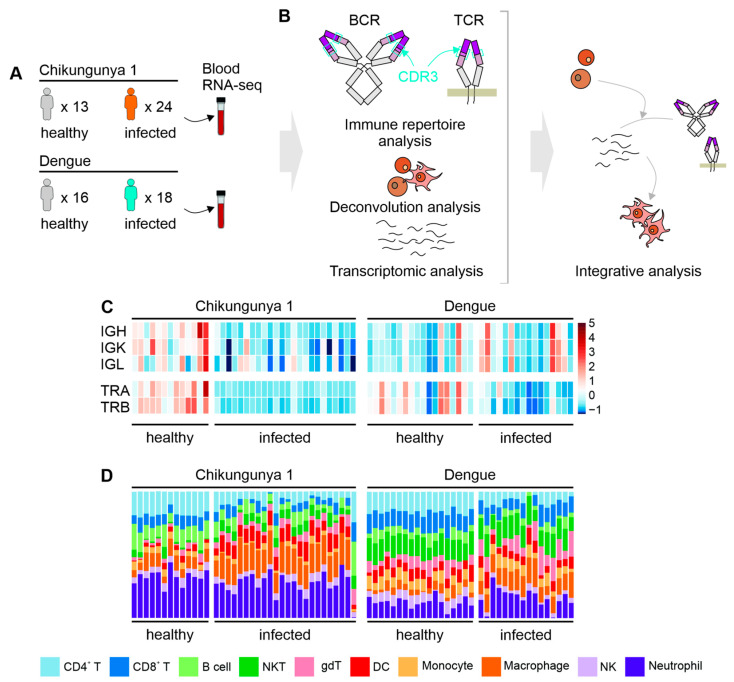Chikungunya-Driven Gene Expression Linked to Osteoclast Survival and Chronic Arthralgia.
Chikungunya fever (CHIKF), caused by the Chikungunya virus (CHIKV), manifests as acute febrile illness often associated with polyarthritis and polyarthralgia. Although the acute symptoms resolve within two weeks, many patients experience prolonged joint pain and inflammation, resembling rheumatoid arthritis (RA). This study aimed to identify molecular markers related to joint pain and chronicity in CHIKV-infected individuals by analyzing blood transcriptomes using bulk RNA sequencing. B- and T-cell receptor (BCR and TCR) diversity was assessed through computational analysis of RNA-seq data, revealing a significant reduction in CDR3 diversity in CHIKV-infected individuals compared to healthy controls. This reduced diversity was associated with the upregulation of genes involved in osteoclast differentiation and activation, particularly through the RANK/RANKL signaling pathway. These findings suggest a potential link between immune dysregulation and enhanced osteoclast activity, which may contribute to the persistence of joint pain in chronic CHIKF. Targeting osteoclast-related pathways could offer therapeutic strategies for managing chronic symptoms in CHIKF patients.
Authors
Urbanski AH, Maso VE, Martins FM, da Costa-Martins AG
External link
Publication Year
Publication Journal
Associeted Project
Systems Immunology of Human Diseases
Lista de serviços
-
As antisense RNA gets intronic.As antisense RNA gets intronic.
-
Androgen responsive intronic non-coding RNAs.Androgen responsive intronic non-coding RNAs.
-
Conserved tissue expression signatures of intronic noncoding RNAs transcribed from human and mouse loci.Conserved tissue expression signatures of intronic noncoding RNAs transcribed from human and mouse loci.
-
The intronic long noncoding RNA ANRASSF1 recruits PRC2 to the RASSF1A promoter, reducing the expression of RASSF1A and increasing cell proliferation.The intronic long noncoding RNA ANRASSF1 recruits PRC2 to the RASSF1A promoter, reducing the expression of RASSF1A and increasing cell proliferation.
-
Antisense intronic non-coding RNA levels correlate to the degree of tumor differentiation in prostate cancer.Antisense intronic non-coding RNA levels correlate to the degree of tumor differentiation in prostate cancer.
-
Insight Into the Long Noncoding RNA and mRNA Coexpression Profile in the Human Blood Transcriptome Upon Leishmania infantum Infection.Insight Into the Long Noncoding RNA and mRNA Coexpression Profile in the Human Blood Transcriptome Upon Leishmania infantum Infection.
-
Long non-coding RNAs associated with infection and vaccine-induced immunityLong non-coding RNAs associated with infection and vaccine-induced immunity
-
Comparative transcriptomic analysis of long noncoding RNAs in Leishmania-infected human macrophagesComparative transcriptomic analysis of long noncoding RNAs in Leishmania-infected human macrophages
-
SARS-CoV-2 Selectively Induces the Expression of Unproductive Splicing Isoforms of Interferon, Class I MHC, and Splicing Machinery Genes.SARS-CoV-2 Selectively Induces the Expression of Unproductive Splicing Isoforms of Interferon, Class I MHC, and Splicing Machinery Genes.

